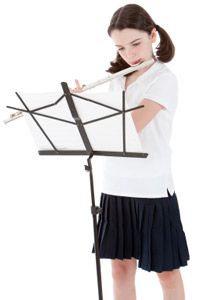Private School Curriculum
Private school curriculum is set by the individual school charter, unlike public schools, which are subject to strict curriculum guidelines developed by the state. Though the majority of private schools are free to teach the curriculum of their choosing, they're still subject to basic educational requirements determined by their local Department of Education. These requirements vary widely from state to state, but they generally include health and safety measures to protect the well-being of students, such as regulations on transportation, food handling, employee conduct and record-keeping. The requirements may or may not address the curriculum, but if they do, the standards are more flexible than those that govern public schools [source: Wisconsin Department of Public Schools].
This curriculum flexibility allows private schools to focus their teachings on areas they deem important, or on subjects that meet the school's basic philosophy. For example, religious schools are permitted to teach faith-based classes that use the Bible or other religious texts, all of which are banned in the majority of public schools. One of the biggest debates over this topic lies in the teaching of creationism vs. evolution in science classes. While most public schools are required by law to teach evolution only, private schools are free to teach either or both of these theories.
Advertisement
Many private schools, particularly at the high school level, offer students the chance to participate in programs not found at most public schools. For instance, at arts-based private high schools, students may spend half the day on regular academic studies and the other half of the day pursuing vocal or dance training. Other curriculums focus on athletics, honors disciplines or even special-needs programs for students who require additional academic guidance or help with study skills. At the majority of public schools, these types of special programs are often under-funded or nonexistent. For instance, many public school students in highly populated urban areas may take part in art, music or gym classes only once a week due to budget constraints.
Another benefit to private school curriculum is the chance for students to thrive under alternative teaching philosophies. In schools that follow the popular Waldorf or Montessori programs, for example, children aren't graded on performance and don't study in a formal, structured classroom, particularly in the early years. The Quaker-based Friends school employs a curriculum where all classes are taught in context around a specific topic. If the week's topic happens to be the ocean, all math, English, reading and other classes for the week will be based around aspects of the ocean, which gives children a context for learning.
These types of teaching methodologies are vastly different from those implemented in public schools, which must serve up results when it's time for students to take standardized tests. While public schools are often forced to teach to the test (so to speak), private schools can take the time to develop the student's curiosity while building a life-long love of learning.
